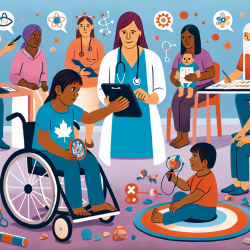Introduction
The global refugee crisis has led to an increased focus on the mental health challenges faced by refugees, particularly children. A recent systematic review titled "Family-based mental health interventions for refugees across the migration continuum" provides valuable insights into the effectiveness of family-based interventions. This blog aims to help practitioners enhance their skills by implementing the outcomes of this research or encouraging further exploration into this critical area.
Understanding Family-Based Interventions
Family-based mental health interventions are designed to address the mental health needs of refugees by involving multiple family members in therapy. The review identified three primary types of interventions:
- Parenting Groups: These focus on enhancing parenting skills to improve child development and reduce mental health issues.
- Multiple Family Groups: These involve families facing similar stressors, promoting shared learning and support.
- Home Visiting Interventions: These are delivered in the home setting, focusing on the unique challenges faced by refugee families.
Key Findings and Implementation Strategies
The review highlights several key findings that practitioners can leverage to improve outcomes for refugee families:
- Effectiveness: Family-based interventions have shown potential in improving mental health outcomes for both children and caregivers. However, the evidence is still emerging, and more rigorous studies are needed.
- Non-specialized Providers: Many interventions utilize non-specialized or peer providers, which can be effective but require proper training and support.
- Common Components: Successful interventions often include components such as positive parenting skills, family communication practices, and psychoeducation.
Practitioners are encouraged to incorporate these components into their practice and consider the unique cultural and contextual needs of refugee families.
Encouraging Further Research
While the review provides a solid foundation, it also highlights the need for further research, particularly in humanitarian settings. Practitioners can contribute to this body of knowledge by:
- Participating in or initiating research studies focused on family-based interventions.
- Collaborating with academic institutions to explore new intervention models.
- Sharing insights and outcomes from their practice to inform future research.
Conclusion
Family-based mental health interventions hold promise for improving outcomes for refugee families. By implementing the findings from the recent systematic review and engaging in further research, practitioners can play a crucial role in enhancing the mental health and well-being of refugee children and their families.
To read the original research paper, please follow this link: Family-based mental health interventions for refugees across the migration continuum: A systematic review.










